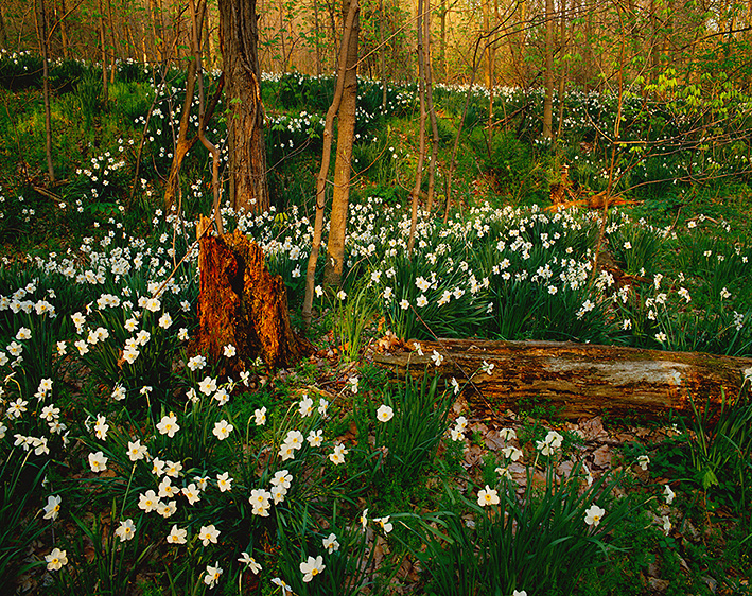At the intersection of her professional and personal convictions, Hilary Schroeder has what she calls “broadly, an interest in the way that fine art can serve as a tool for environmental engagement, contemplation and activism.” The assistant curator for the Asheville Art Museum has explored that area of focus to some degree in past projects, but it wasn’t until her workplace received a gift of photographs taken by Robert Glenn Ketchum that she began contemplating an exhibition centered on the preservation of public lands.
“[I was] thinking about the way that he was looking at this natural beauty at the Cuyahoga Valley National Park [in northern Ohio],” Schroeder says. “But also underneath this beauty was the knowledge of ways that the land had been managed and mismanaged both before it became a National Park Service entity and after. That led me to look at other works in the collection that were from a similar perspective, thinking about natural land.”
The result is Public Domain, which opens Wednesday, May 19, and will be on display through Monday, Aug. 30. The show’s timeline spans the 1920s work of Asheville-based photographer George Masa, which played a major role in the creation of the Great Smoky Mountains National Park, to that of contemporary Georgia-based artist Timothy McCoy, whose Long, Long Journey to the Sea portfolio tracks the path of a drop of water from the mountains to the ocean. But while these and other images are likely to prove inspirational for viewers, it was the Ketchum photos, including some from his Overlooked in America: The Success and Failure of Federal Land Management series, that helped set the tone for the other selections.
“There is this sort of beauty and etherealness that is present in [Ketchum’s] works,” Schroeder says. The absence of people, she adds, “allows the viewer to immerse into these landscapes.”
“The photographers are standing behind their camera, looking at it from their artistic perspective, but also identifying scenes that sort of serve their goal of inspiring conservation and environmentalism,” Schroeder explains.
Inspiring action
Also prompting the timing of Public Domain is the 75th anniversary of the Department of the Interior’s Bureau of Land Management. In hopes of fostering and strengthening patron interest in environmental activism, the museum will offer public programming around the exhibition, including an event with local photographer Benjamin Dimmitt. A longtime landscape and wetlands photographer, Dimmitt is currently documenting “ghost forests” — areas of gray, lifeless trunks created when rising ocean water begins to flood woodland areas that contain freshwater-dependent trees.
Dimmitt’s diptychs showing the same place in different years, illustrating the impact of elevated sea levels, were used in oceanographer Matt McCarthy’s 2018 study, Rapid Coastal Forest Decline in Florida’s Big Bend. And, according to Dimmitt, McCarthy is contributing his research to Dimmitt’s fall 2022 book, An Unflinching Look: Elegy for Wetlands, which will be published by the University of Georgia Press.
“Through programming and conversations with the artists who are actively working outside of the visual arts field and actually engaging in interdisciplinary work, we hope that visitors will be able to make a connection about the visual impact of the arts upon the back-end scientific side of things,” Schroeder says.
AAM staffers are also optimistic that prospective attendees’ enhanced relationship with nature during COVID-19 will lead to a stronger bond with the exhibition. Like many people who’ve been unable to congregate much indoors since mid-March 2020, Schroeder notes that she’s spent a lot of time outside this past year. She believes people who’ve similarly found greater solace outdoors amid the pandemic will find significant value in Public Domain’s diverse imagery as well.
“Of course, you’re looking at really lovely, stunning photographs,” Schroeder says, “but also hopefully thinking about how one has a personal responsibility to make small changes in your own life and also think about broader impacts of the ways that we move through the world.”
For more information or to purchase tickets, visit ashevilleart.org.




Before you comment
The comments section is here to provide a platform for civil dialogue on the issues we face together as a local community. Xpress is committed to offering this platform for all voices, but when the tone of the discussion gets nasty or strays off topic, we believe many people choose not to participate. Xpress editors are determined to moderate comments to ensure a constructive interchange is maintained. All comments judged not to be in keeping with the spirit of civil discourse will be removed and repeat violators will be banned. See here for our terms of service. Thank you for being part of this effort to promote respectful discussion.